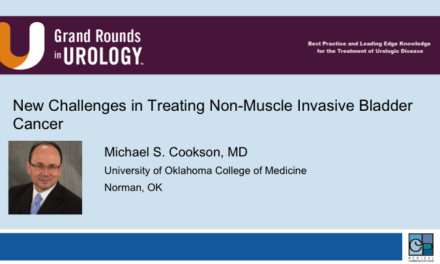Sanjay G. Patel, MD, presented “Blue Light vs. White Light Cystoscopy for NMIBC” during the International Bladder Cancer Update 2021 virtual conference in April 2021.
How to cite: Patel, Sanjay G. “Blue Light vs. White Light Cystoscopy for NMIBC” April 2021. Accessed Jan 2025. https://dev.grandroundsinurology.com/blue-light-vs-white-light-cystoscopy-for-nmibc/
Blue Light vs. White Light Cystoscopy for NMIBC – Summary:
Sanjay G. Patel, MD, Assistant Professor of Urology at the University of Oklahoma in Oklahoma City, considers the benefits of blue light versus white light cystoscopy for non-muscle-invasive bladder cancer (NMIBC) imaging. He begins by explaining that NMIBC has a high rate of recurrence within 5 years as well as a reasonable progression rate, and notes that high-quality transurethral resection of the bladder (TURBT) is essential to management, both as a therapeutic and a prognostic first-line treatment. One of the key elements of high quality TURBT is good visualization of the tumor, but that can be difficult with standard white light cystoscopy. Dr. Patel touches on several enhanced technologies to detect bladder cancer, including narrow band imaging, before focusing on blue light cystoscopy with Cysview. Blue light cystoscopy uses a photosensitizing agent injected into the bladder to highlight tumors in a reddish color, and is available both in the clinic and the operating room. Dr. Patel goes over the evidence from numerous multicenter phase III trials regarding blue light cystoscopy’s efficacy compared to white light cystoscopy. He points out that metaanalysis showed that blue light cystoscopy found at least one additional lesion in approximately 1 in 4 patients with Ta/T1 NMIBC. For those patients with CIS, more than 1 in 4 cases was detected only with blue light cystoscopy with Cysview, and not with white light cystoscopy. Dr. Patel then notes that using blue light cystoscopy appears to significantly reduce the rate of recurrence and progression and increase time to recurrence and progression compared with white light cystoscopy. He concludes by discussing when blue light cystoscopy should be used and by looking at different guideline recommendations.
About the International Bladder Cancer Update 2021 virtual conference:
The International Bladder Cancer Update (IBCU) is a CME conference focused on the diagnosis and treatment of bladder cancer. The conference offers medical professionals an opportunity to listen to updates from, and interact with, expert international faculty to improve knowledge and determine best treatment practices to improve patient outcomes. IBCU encompasses expert lectures, interactive discussions, a panel roundtable, debates, and case presentations. It is physician-led, multi-supported, and designed for urologists, urologic oncologists, and other healthcare professionals involved in the treatment of bladder cancer.
ABOUT THE AUTHOR
Sanjay G. Patel, MD, completed his undergraduate training in Biomedical Engineering at
Vanderbilt University. He proceeded to complete medical school at Vanderbilt University in
Nashville, Tennessee, and urologic surgery training at Vanderbilt University Medical Center. After
completing a Society of Urologic Oncology Fellowship at the University of Chicago, he joined the
faculty as an Assistant Professor in the Department of Urology at the University of Oklahoma in Oklahoma City.
Dr. Patel treats all urologic cancers (adrenal, kidney, ureter, bladder, urethra, and testicular
cancer) utilizing open, laparoscopic, and robotic surgery techniques. He has a particular interest
in the use of minimally invasive robotic approaches to treat urologic malignancies and has
extensive robotic surgery experience. He oversees the Bladder Instillation Clinic, where patients’ bladders
are directly treated with immunotherapy and chemotherapy to treat superficial bladder cancer. He is also developing techniques to perform intracorporeal robotic urinary diversions,
where he is using minimally invasive robotic techniques to create bladders out of the
intestinal tract.
Dr. Patel works with the Department of Engineering at the University of Oklahoma to develop novel diagnostic and therapeutic technologies to treat urologic disease. He also has an interest in genetic and molecular profiling of cancers, and how that kind of profiling can be used to guide treatment of urologic cancer.




